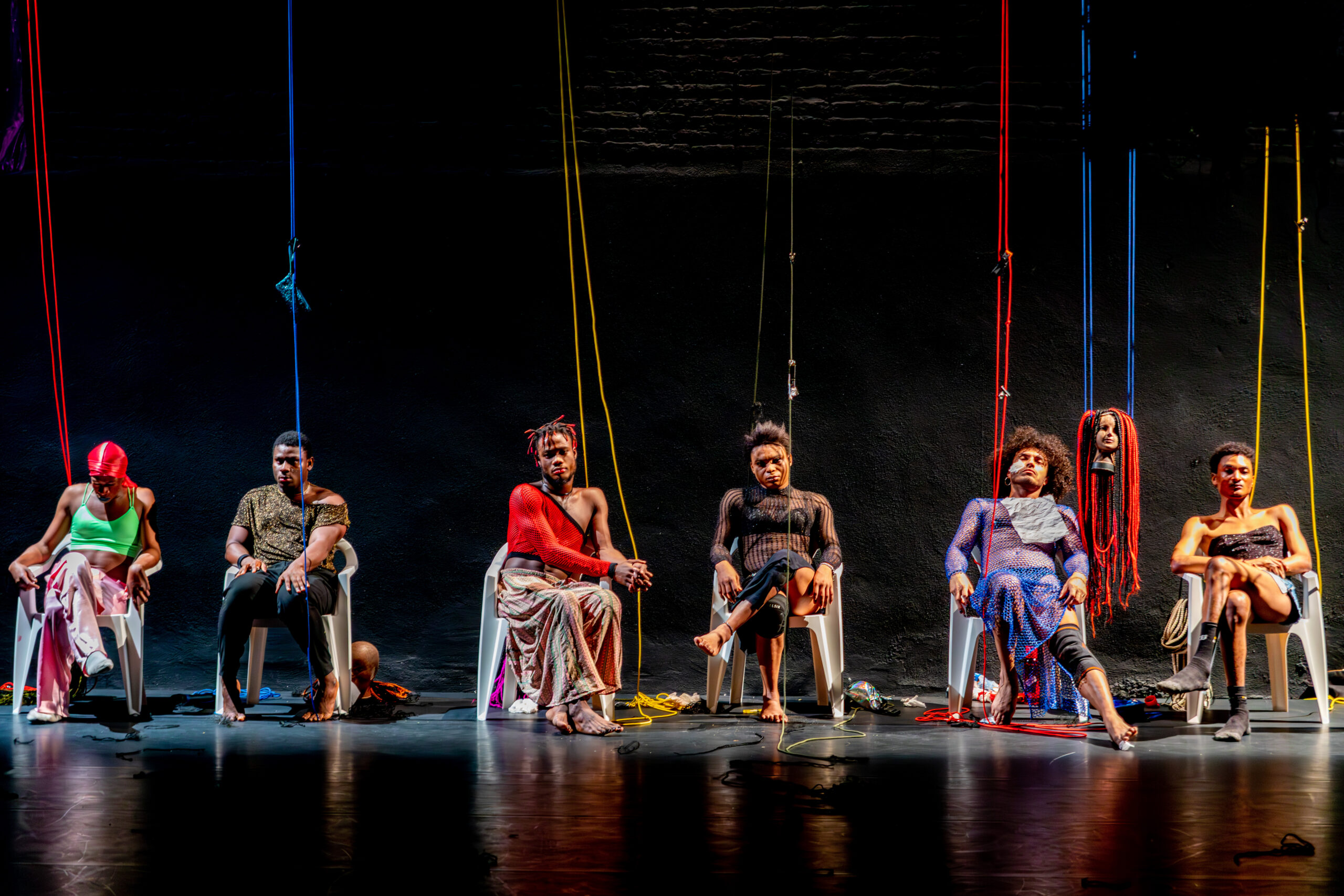anticoloni-yas slay
amilton de azevedo writes about Prophétique (on est déjà né.es), by Nadia Beugré (Ivory Coast), presented in the 2024 Festival TransAmériques (FTA – Tiohtià:ké/Montreal). this text is part of a special coverage; the critic traveled to Canada at the invitation of the FTA.
“In spite of the world, I call on you to live regardless of everything. In the radicality of the impossible. Here, where all the doors are closed, and for this reason we are led to discover the map of the breaches.” [Jota Mombaça, in Não vão nos matar agora (Won’t kill us now), in a free translation]
“I don’t need a disguise / Here is my face / I speak for my difference / I defend what I am / And I’m not so strange.” (Pedro Lemebel, I Speak For My Difference manifesto)
Loud music, high energy both in the stage and from the audience, a chanter, voguing and many, many dips. Entering the Monument-National’s Salle Ludger-Duvernay for the premiere of Prophétique (on est déjà né.es) in 2024 FTA was just like walking into a ballroom event. Celebrating black queerness freedom and right to exist beyond the normative expectations is at the center of Nadia Beugré’s piece.
Salon workers and divas: within Prophétique borders are blurred and the freedom of the night meets daily labor as one can exist in their wholeness at all time. There is no need for secrecy or disguise as they are what they are – fabulous. Beugré’s choreography builds up a joyful atmosphere through humor as it has the potential to act as a tool of creating community and also as a form of resistance.
- Read more: access this link for more theater critics written in english
- Read more: follow ruína acesa’s FTA special coverage
White plastic chairs in the back of the stage bring up daily life, whilst their gestures and dances with the large tufts of hair spread through the set makes Prophétique a beautiful mess – no shade. From ballroom voguing towards a barking-howling vigorous compositions, the performance invites the audience to follow their dances through many unpredictably energetic and poetic places.
As for the dance styles, coupé-décalé meets voguing and brazilian moves from samba to passinho and there is even space for an aerial sarrada by Acauã Shereya El Bandide. The performers (Beyoncé, Canel, Jhaya Caupenne, Taylor Dear, Shereya and Kevin Kero) go on solos, duos, trios, chorus by living through all the possibilities of relating with one another. Kero acts as a DJ just in the beginning; Prophétique maintains a chanter in most of its scenes, and throughout the piece, their will be the songs, through voices and clapping and energy.
The idea of a prophecy brought up in the performance’s title is of a self-fulfilled one: on est déjà né.es – we are already born. Black queerness and their continuous discovery and construct of the possibility of a free identity, always in motion, stands up against the normative restrictions and colonial violence. They were born, they exist, they are fierce, they will not tolerate hate. Prophétique‘s powerful and touching mise-en-scène is a straight-up anticoloni-yas slay move.
Beugré’s choreographies are a remarkable reminder that the diversity within existence will prevail. And celebrate, and mesmerize, and joke around, and reshape the world. When Shereya takes the frontstage and shouts common insults and slurs directed towards LBTQIA+ population, her slowly appropriation of the terms turn them into queer slangs and violence becomes dance.
Whilst some of Prophétiques compositions are easily apprehended, others might be more tricky to decipher. But, as Jota Mombaça once wrote to Castiel Vitorino Brasileiro, “I am not interested in the meaning of such images, but in the prophecies within them. In other words: it is not the meaning, but the whisper that motivates me” (Não vão nos matar agora, in free translation).
There is humor, there is sensuality, there is power, there is community, there is rituality. Prophétique accesses many perspectives on black queerness and is able to organically build up a strong and deep statement through its fragmentation and chaotical beauty. The greatest revenge to gender violence is to insist on existing in one’s entirety. As Paco Vidarte wrote in his Ética Marica (Faggot Ethics, in free translation), “our becoming will be created by ourselves through the blow of a razor and a heel“. To create the future by realizing it is already around us: dissident performativities, theatricalities and narratives take the center of the stage. Anticoloni-yas slay.

